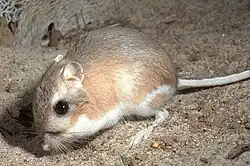Kangaroo rat
Kangaroo rats are small rodents from North and Central America. They got their name because they look like small kangaroos when standing upright. But they are not related to kangaroos, except that they are mammals. The genus of the kangaroo rats is called Dipodomys.
| Kangaroo rat Temporal range: Late Pliocene - Recent | |
|---|---|
 | |
| Scientific classification | |
| Kingdom: | |
| Phylum: | |
| Class: | |
| Subclass: | |
| Order: | |
| Family: | |
| Genus: | Dipodomys Gray, 1841 |
Currently, there are 22 species in that genus. They vary in size from 10cm to 20cm, and they weigh between 35 and 180 grams for adult animals.
Kangaroo rats live in dry climates. They can live in deserts also, like the Thar Desert. This means that they have developed traits from other species that live in such climates, but are not related to them. Some of those species are the jerboas, which can be found in the deserts of Africa and Asia, and the hopping mice of the Australian Outback.
All of those species have highly developed hind legs. They also live in deep burrows that protect them from the worst heat of the day. Water may be difficult to find in such climates. Therefore, they only rarely need to drink water. Instead, they have a very efficient metabolism. Their kidneys are much more efficient than human kidneys. They can also chemically split off water from the food they eat.
Kangaroo mice are found in areas of the United States and Mexico, where there is some grass or vegetation left, but which have a rather dry climate. Scientists call those areas arid and semi-arid. The animals live on seeds, leaves, nuts and other fruit they can find. They also catch insects. They are also known for stockpiling (keeping) some food in their burrows, for bad times.
Usually, the animals have a color that blends in nicely with the sandy surroundings. Most often they are a tone of dark yellow to deep brown.
They are nocturnal which means that they are active during the night.
Other websites
![]() Media related to Kangaroo rat at Wikimedia Commons
Media related to Kangaroo rat at Wikimedia Commons
![]() Data related to Kangaroo rat at Wikispecies
Data related to Kangaroo rat at Wikispecies